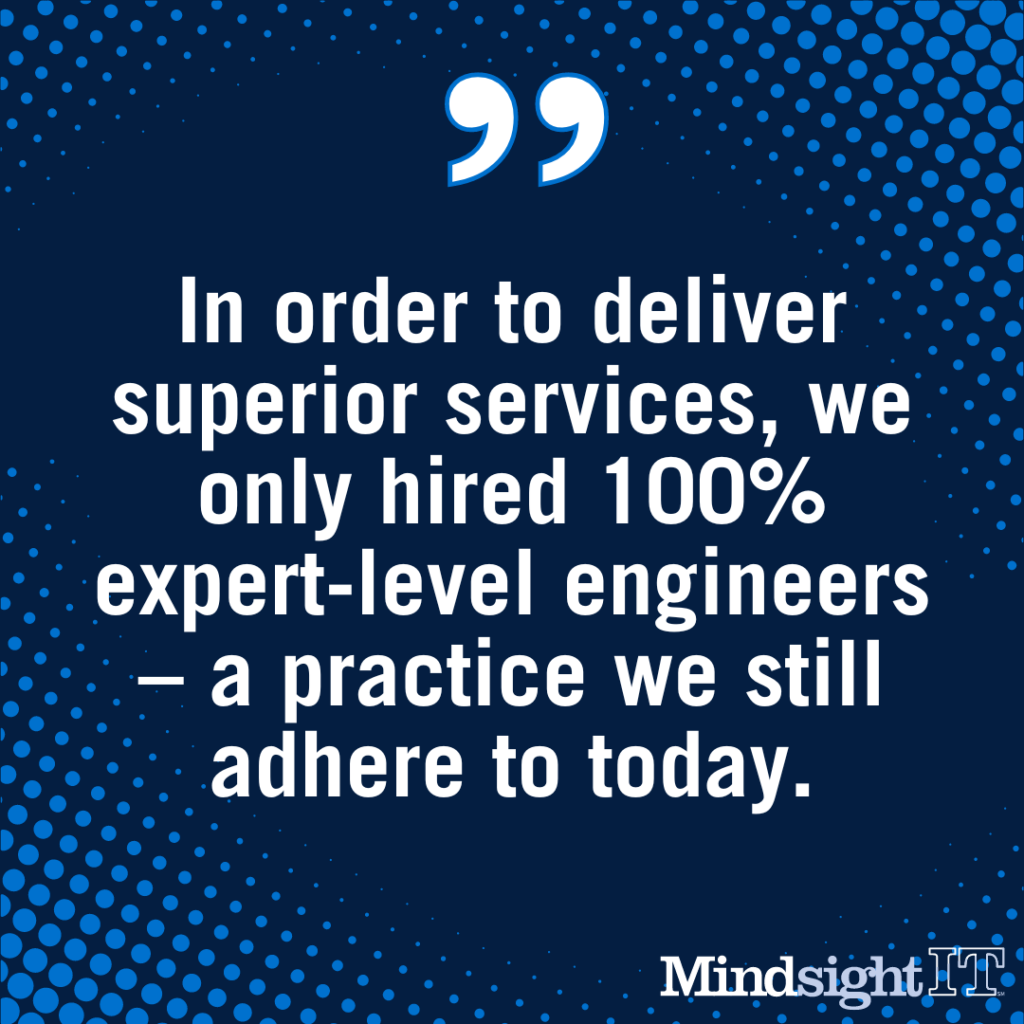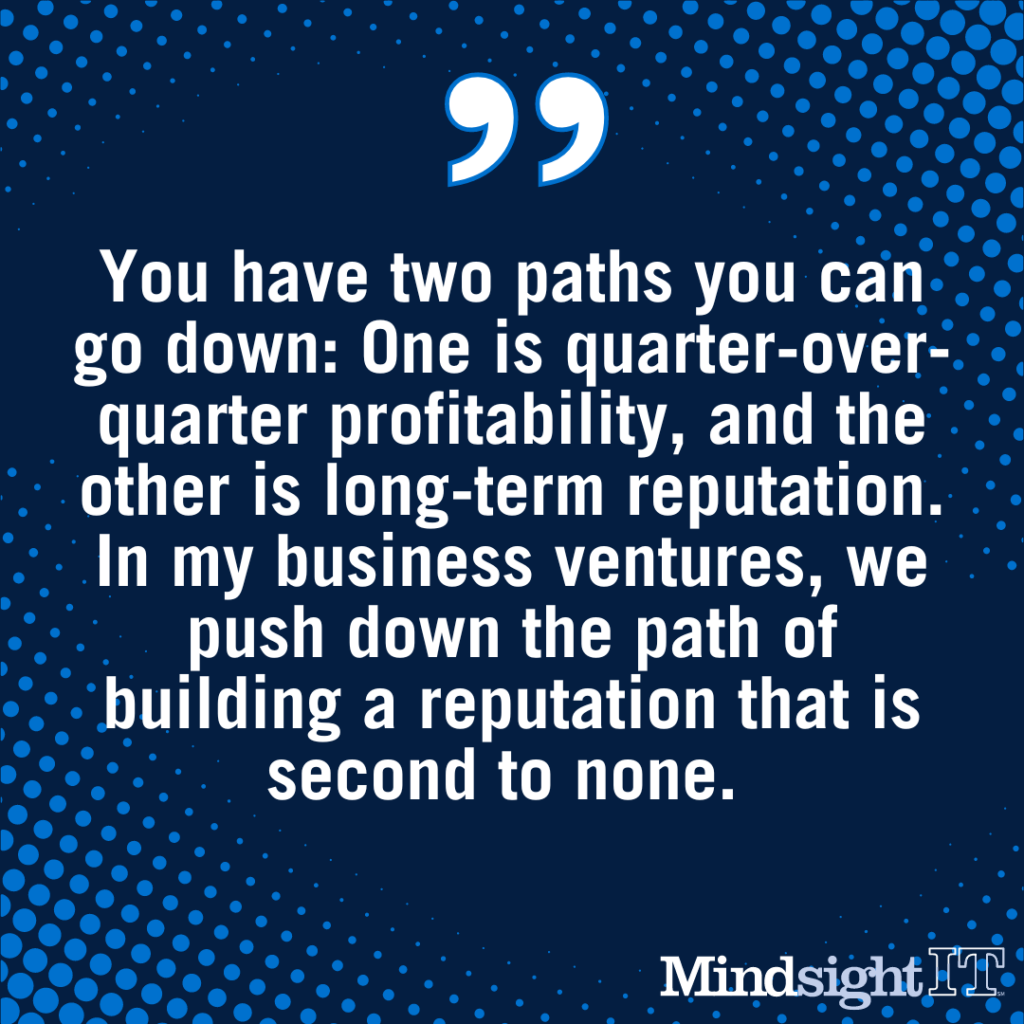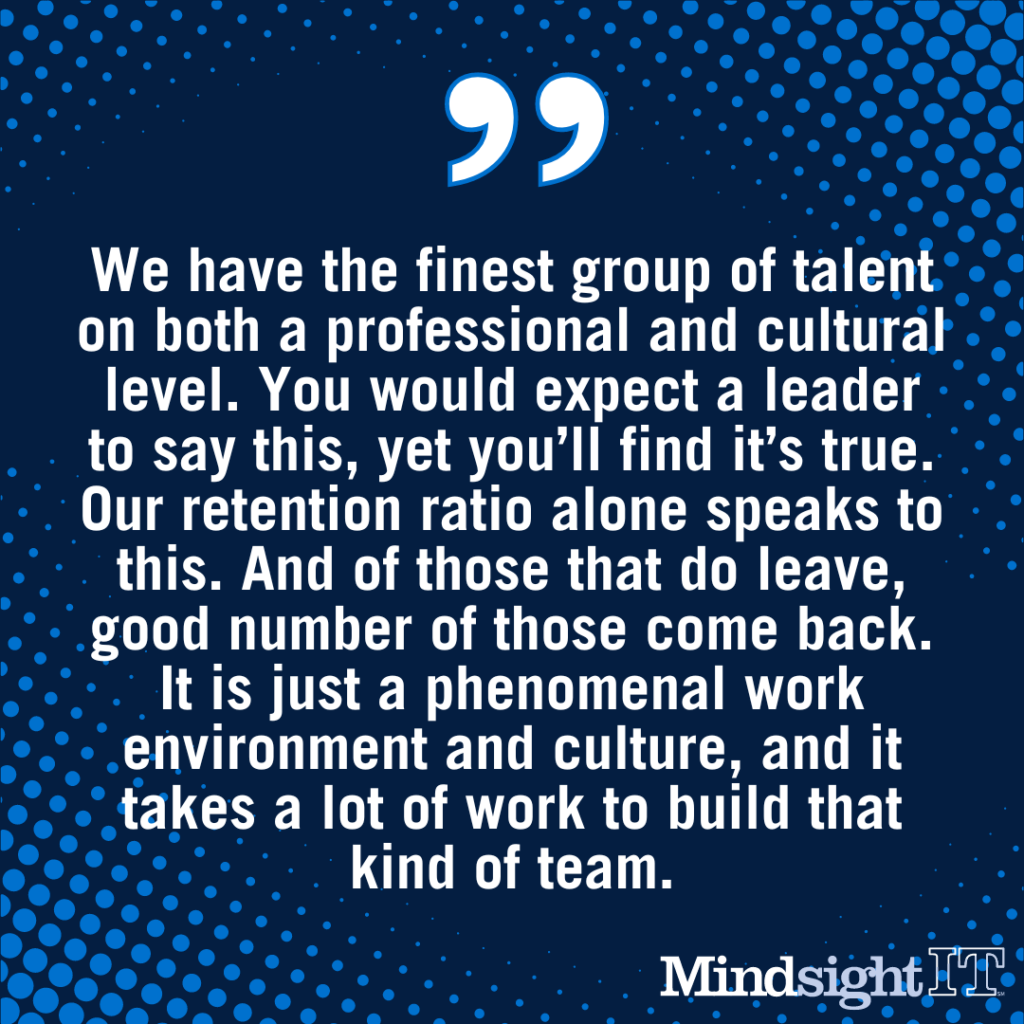July 25, 2024
As Mindsight, the Chicago based IT managed services provider, prepares to celebrate its 20th anniversary, Edward Kapelinski, the company President and CEO spent some time talking to us about the company’s evolution, what sets Mindsight apart, and how the company stays relevant in an ever-changing marketplace.
Q: You’ve been at Mindsight almost from the start. How has the company evolved over the last two decades?
A: Alan Holmes and Tony Varriale started Tympani (rebranded to Mindsight in 2016) back in 2002. I had just sold my last firm and was looking to build another business and get back into technology. My current business partner, and longtime friend, Jim Folliard, introduced me to Alan who was looking for someone with experience in scaling businesses. The vision of Mindsight was to be a leading IT services company – to provide consulting, deployment, and support services as an extension of a client’s in-house team. In order to deliver superior services, we only hired 100% expert-level engineers – a practice we still adhere to today. We pride ourselves on partnering with mid-market companies who expect top notch, experienced technical engineers capable of solving the most complex IT related challenges – but who are also business savvy and could translate technology-speak to business value. We started with VOIP technology (a new technology back then) and rolled out services with each new advancement in infrastructure and communications technology.

Q: What sets Mindsight apart from the competition?
A: Mindsight delivers enterprise grade services/managed services to mid-market companies on a cost-effective basis. There’s an enormous amount of competition that has popped up over the last 10 years especially in the MSP space; most of these players started in the SMB market serving companies under 100 employees. Most are primarily help desk providers; their infrastructure services are light at best. But they’ve jumped on the managed services bandwagon and will try to sell upstream whether they have the expertise or not. Mindsight provides enterprise-grade services to the mid-market. What makes our services enterprise-grade? The people, processes and policies, and technologies.
For example, every year we go through an audit—the SSAE 18 SOC 2 Type II Audit—to ensure that our people, processes, and policies are consistent with best-in-class, enterprise grade managed services solutions. Even though it’s an expensive and time-consuming endeavor, we’ve gone through the audit each year over the past decade. It lets our clients know we have the qualifications and certifications to deliver excellent services – that we’re not just some guys providing services out of a garage.
Another differentiator is our people. Mindsight (unlike the typical industry best in class financial model) only employs tier three expert-level engineers. Costs start to add up by not employing lower cost tier one and tier two engineers – but we do not pass that these overages to our clients.
I was raised by an idealist father who was a phenomenal businessman. His belief was that in the end, you have two paths you can go down: One is quarter-over-quarter profitability, and the other is long-term reputation. In my business ventures, we push down the path of building a reputation that is second to none.

When we first got into this market, there was a company called Berbee Information Networks that was later acquired by Computer Discount Warehouse (CDW). Matt M. led the Berbee engineering office in Chicago with a best-in-class group of engineers. We modeled ourselves against that expert-level engineering structure. All companies have some expert-level engineers, but we have the largest 100% expert-only team in the Chicago area. When you call us with an issue, you need the problem fixed immediately. The financial cost of lost operational efficiencies when systems are down is immense for mid-market companies. When an issue arises, our clients know it will be resolved quickly. That’s what Mindsight experts do.
Q: How do you define superior customer service?
A: We have a culture at Mindsight where everybody does an excellent job and provides excellent service. In essence we try to flip the script. As a result, clients are not just putting in a good word for Mindsight, they are telling people, “You need to work with Mindsight.” We hire people that we feel will be true partners to our customers – that have the drive to excel in whatever they are doing.
Second, it’s about staying relevant. We invest in ensuring our clients are always in front of the latest and greatest proven technology solutions. To accomplish that in this ever-accelerating technology industry, you must continuously pivot, having every employee keep up with what’s new and what’s considered an advanced technology for our clients so we can continue to provide value. We are dedicated to training everyone, sales and marketing to finance and HR, in technology and solution advancements.
The third pillar of our customer service vision is for the marketplace to understand that this is an organization with integrity. We’re good people, we want to do the best we can for clients, and we’re honest in our approach and our appraisal. Every vendor will proclaim integrity, because that’s what makes people comfortable. But you need to experience it. Oftentimes, our potential clients are blown away that we will turn an opportunity down, as lucrative as it may be, to do the right thing. By providing a sense of trust and integrity, clients know that when they’re working with Mindsight, they’re getting the real deal.
Q: What are you most proud of at Mindsight?
A: Our reputation in the marketplace. We have the finest group of talent on both a professional and cultural level. You would expect a leader to say this, yet you’ll find it’s true. Our retention ratio alone speaks to this. And of those that do leave, good number of those come back. It is just a phenomenal work environment and culture, and it takes a lot of work to build that kind of team. My senior team members are all mid-career, phenomenally successful people who are immensely talented at hiring, onboarding, training, and managing. They’re focused on ensuring that all employees have a voice and career accomplishments are sincerely appreciated as a member of the team. Their talents are correctly matched to their job, so they enjoy what they’re doing and they feel secure in a fiscally well-run company that is direct in their appraisal and communications.

Q: What is your team looking for technically and culturally in new hires?
A: Technically, they must have advanced experience in their respective career. Culturally they must value and respect others and have a serving attitude of excellence. And they must have a high level of energy. Additionally, we utilize Culture Index, a best-in-class application for defining an individual’s job-relevant traits. We also utilize Wonderlic to ensure that folks have the necessary technical acumen.
Q: How would you define your career?
A: I’d define myself as a builder. My formal education is in Finance, but I’ve had a proclivity and passion in building since I was a child. I built go-karts and mini-bikes and forts as a kid. I’ve built a number of high-end residential homes. I’ve facilitated the building of four highly successful businesses. I enjoy technology because I’m a curious “how to” person, and I like the pace of change in technology.
Q: Who mentored you along the way?
A: When I first started my career in sales and leadership, I invested significant time in developing an understanding of the human psyche and human motivation. My father, an idealist who was naturally talented at making people feel comfortable, said it’s simple: Find people you can legitimately help and invest time to care about them; basically make friends with them. And as long as you are always truthful in what you’re doing, it gives you the power to be passionate and to let people feel your passion and buy into wherever you are leading them. And my mom was a very assertive go-getter. A keep-those-feet-moving kind of personality. My other mentor is Earl Pearlman, a consummate leader and salesperson. He came from the IBM days, so everything was defined by how financially business and technology intersect. Sales to him was about building relationships, properly qualifying, and getting clients comfortable. Getting them to see the value, and then gently leading them over the threshold to make a buying decision.
Q: How do you spend your time outside of the business?
A: At an earlier age, I enjoyed water skiing and running and, once in a while, crazy stuff like skydiving. Today, I invest my time with my wife, kids, and friends. I enjoy reading history and historical biographies of leaders by authors such as Doris Goodwin and David McCollough. And I love gardening and perfecting things like my boat. I also receive great pleasure and personal satisfaction by contributing to the greater good through philanthropy.